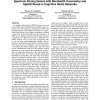Free Online Productivity Tools
i2Speak
i2Symbol
i2OCR
iTex2Img
iWeb2Print
iWeb2Shot
i2Type
iPdf2Split
iPdf2Merge
i2Bopomofo
i2Arabic
i2Style
i2Image
i2PDF
iLatex2Rtf
Sci2ools
141
click to vote
MOBIHOC
2010
ACM
2010
ACM
Spectrum pricing games with bandwidth uncertainty and spatial reuse in cognitive radio networks
In cognitive radio networks (CRN), primary users can lease out their unused bandwidth to secondary users in return for a fee. We study price competition in a CRN with multiple primaries and multiple secondaries in a region, where each primary tries to attract secondaries by setting a lower price for his bandwidth than other primaries. A CRN has two distinctive features, which makes the price competition very different from that in traditional commodity markets. First, in every slot, each primary may or may not have unused bandwidth available. So primaries are uncertain about the number of other primaries from whom they face competition. Second, spectrum is a commodity that allows spatial reuse: the same band can be simultaneously used at far-off locations without interference; on the other hand, simultaneous transmissions at neighboring locations on the same band interfere with each other. As a result, a primary cannot offer bandwidth at all locations, but must select an independent s...
Related Content
| Added | 14 Feb 2011 |
| Updated | 14 Feb 2011 |
| Type | Journal |
| Year | 2010 |
| Where | MOBIHOC |
| Authors | Gaurav S. Kasbekar, Saswati Sarkar |
Comments (0)

